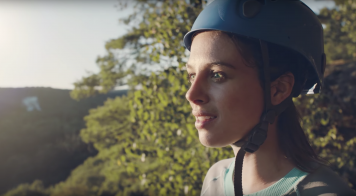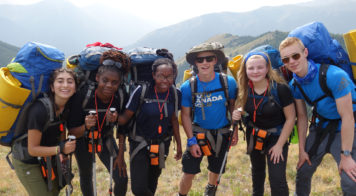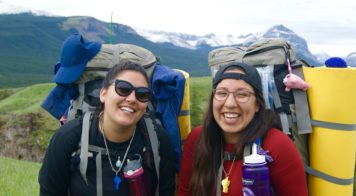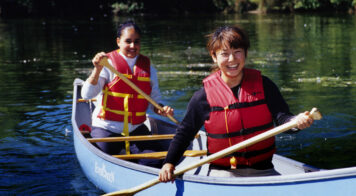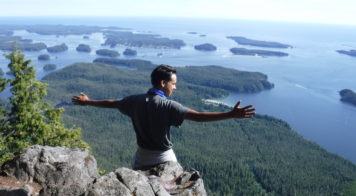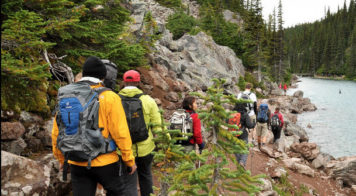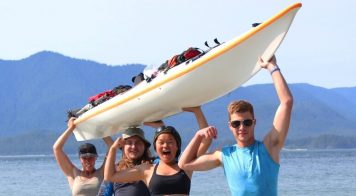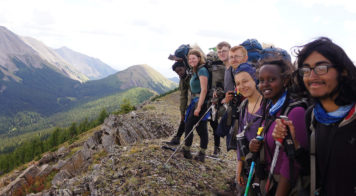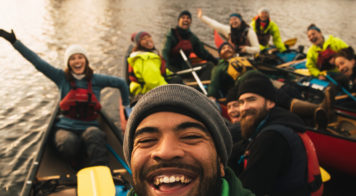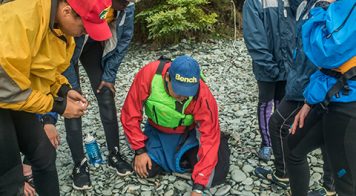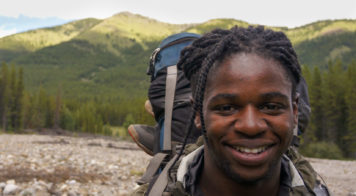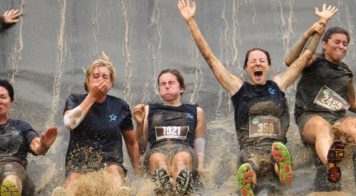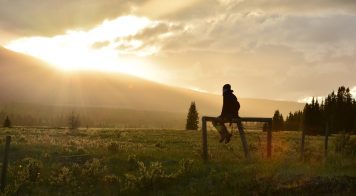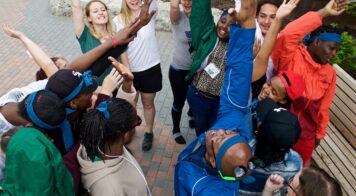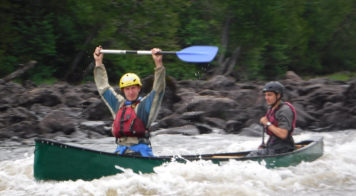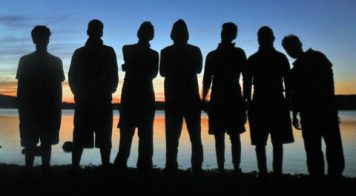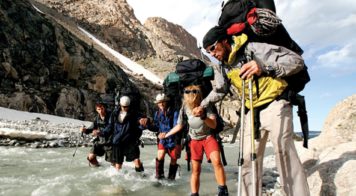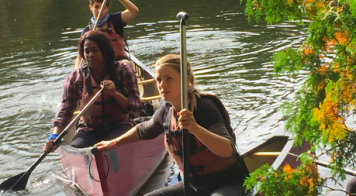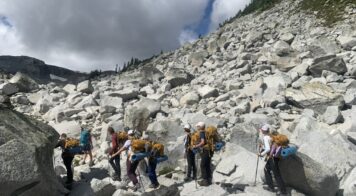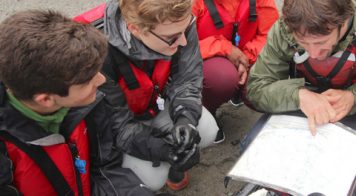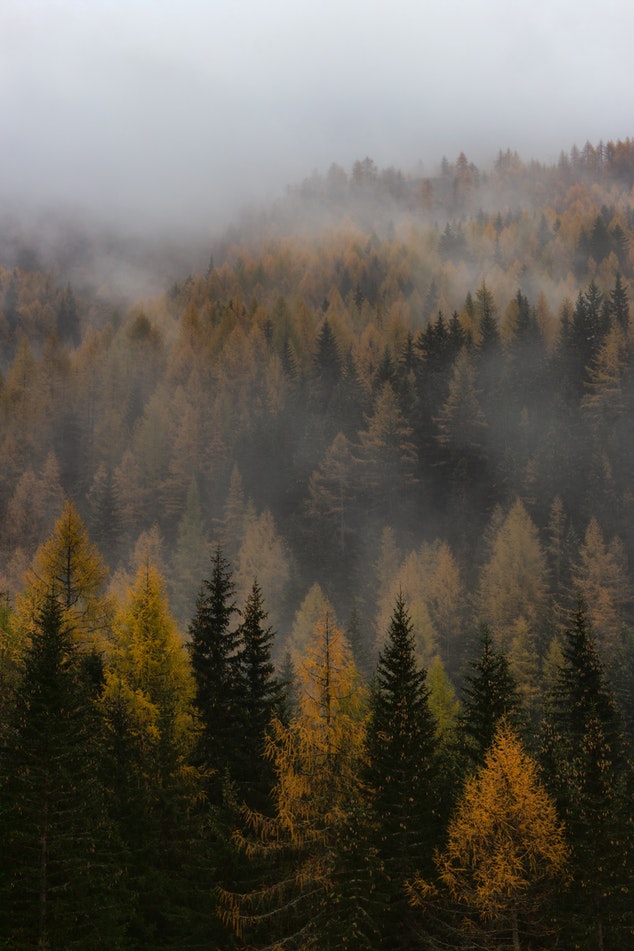Building Tomorrow’s Leaders – BIPoC Outside Interview with Training Academy Director Josephine Baran
Are you ready for a breath of fresh air and a dose of inspiration? Then check out the latest episode of the BIPoC Outside Podcast, where our very own Training Academy Director, Josephine Baran, shares her passion for the great outdoors and her mission to make the outdoor industry more inclusive and diverse.
In this lively and engaging interview, Josephine Baran talks with host Kris Cromwell about the Training Academy‘s innovative approach to developing the next generation of outdoor leaders. Get inspired and learn how you can be part of this exciting movement that is changing the face of the outdoor industry in Canada!
Click the image below to listen:
transcript
Kris:
Hey everyone. Thank you for joining me on the BIPoC Outside podcast. I’m Kris Cromwell. And today we’re sitting down with Josephine Baran. Just the theme is a multi-sport athlete, a professional in the outdoor industry and the director of the Outward Bound Canada Training Academy. So let’s get into it. Shall we?
Of course, you know, this show doesn’t happen without Outward Bound Canada’s Training Academy for outdoor professionals, our title sponsor for this season. With program locations across Canada that offer free programming to address skill gaps in the outdoor sector. The Training Academy is building the next generation of outdoor leaders with a commitment to meaningful Indigenous representation and by prioritizing BIPoC and two S LGBTQ plus inclusion, the academy is re-imagining what the outdoor industry looks like. Check out their website to sign up for free spring and fall sessions. Visit OBC training academy.ca or find their partner link on our website.
We also need to shout out our presenting sponsor. Mountain Gazette Mountain Gazette is a biannual large format magazine, celebrating mountain culture, featuring beautiful long form storytelling from real people who love the outdoors. These are stories that you sit with and you saver. Each issue also contains stunning photography.
These are magazines. You’ll keep, and you’ll come back to Mountain Gazette. When in doubt, go higher. Check them out at mountaingazette.com or find their partner link on our website.
Josephine, good morning. Thank you so much for joining me today.
Josephine:
Oh, it’s great to be here on this Monday morning!
Kris:
Yeah, very early on a Monday, but we’re gonna do just fine, so let’s jump right into it. You’re originally from the UK, is that correct?
Josephine:
It is. I was born in London and, and lived there through to my teens. And my mother was from the UK. My father actually had immigrated from Sri Lanka. He was Tamil and left. You know, there was a lot of internal strife there. But You know, we’d lived there and my mother’s family – her twin sister and her other sister – had immigrated earlier to Canada and talked about how it was just this great place to live, to raise children.
There was just so much opportunity here. And so, you know, really never having visited this country, never having experienced anything about North America, we upped and moved here. And so that was the late eighties. And coming here as a teenager I don’t think I was a very happy child. I was not pleased with my parents for moving me away from everything that I knew and throwing me into a brand new culture, a brand new life.
And, you know, every teenager is a delight, so I’m sure I made it extra easy on my parents.
Kris:
So what was your introduction to the outdoors?
Josephine:
So I think, actually I vividly remember this: We landed in Edmonton International Airport. Coming from Heathrow to Edmonton International airport is vastly different. We came outside and I looked around and I had never seen a sky that big. It was like, you can see forever. And I was just amazed by this idea that you could just go forever and maybe not encounter anything.
And so that was really my first introduction to the outside: walking outside of Edmonton International Airport and thinking, “I really wanna explore this”. And so, you know, we came here and we were like, okay, this is a little different from Europe. Everyone tells us you’ve got big animals here and you know, I’m thinking badger, but that’s not a point of reference that makes any sense when you think of bear, elk and moose.
And so, you know, we were like, okay, let’s hike, but then we didn’t know how to – you know, it’s not like walking in the woods in England. You know, you think about camping and we’re used to being able to maybe eat in tents and not worry about any of that.
There’s no mosquitoes also in England, none. There’s little gnats, but you don’t actually get bitten by mosquitoes. So the whole idea of mosquito repellent was very weird. So there was this really big learning curve. But throughout it all I was like, this is the way that I become Canadian. This was like, you know, as a teenager with a different accent and being brown in a mainly white school, well, this is how I find my common thread.
But it wasn’t quite that easy. Like, that path was not obviously linear and there were a lot of, you know, ups and downs. But for me that was the real start of my connection to the outdoors.
Kris:
What’s your favorite way to get outdoors these days?
Josephine:
Oh, these days it is trail running. It is like at my heart with my dogs, you know, and, and I don’t take music onto the trails or anything like that, so I go without my headphones and just, you know, a winding path up and down and I can lose myself there. That for me is home.
Kris:
Amazing. So as much as you got outside recreationally prior to this job, you still were organizing in the outdoor space. A lot of races, a lot of festivals like, tell me about this prog career progression. How did you decide the outdoors was also a place you wanted to make your career?
Josephine:
You know, it was a little bit accidental. I don’t think I had ever actually thought that a career in the outdoors was a real thing. And you know, part of that was because of my immigrant background on what viable jobs are, like, you know, doctor, nurse, lawyer, scientists, accountant, you, you can name them all.
And so, I did what any good child does and went to university and did science and you know, even after doing science, I was like, I still think I wanna connect the outdoors. So I did environmental conservation after that. And so that was, you know, okay, I can probably still justify that, but you know, in my mind I was like, “well, you go work either for the government or you go work for industry and you have a nine to five job, and this is what you do.
I had connected with Mountain Equipment Co-op actually while my kids were young and I was home with them and I was like, “okay, maybe I’ll just connect with them a little bit so I can still be at home with the kids and work”. And this job just happened to come in where they’re like, “we need someone to do a race for us, and we know you run”.
That was about it, and I was like, “oh, sure, I’ll help you out”. This one time was how it started. You know, I was like, “okay, I, I’m sure we can organize a race”. I’d organized other things. I’ve worked in a lot of different jobs, so we’ll throw this together, then one race led into multiple races, which led into connecting with community partners and bringing them in, which, you know, morphed into really wanting to share knowledge with other people.
So this idea of like, you know, bike 101, backpacking 101, camping 101, all these ways to democratize that knowledge that lives so heavily within certain types of groups, and how do you get other people in, you know, working with Parks Canada with their learn to camp, and the idea that we can take families out and they can learn the skills in a really safe, fun environment with other people that are at the same level of learning as them, and they all are newcomers and, you know, inspire that love in someone else.
So that’s how it started and then it just kind of snowballed from there. At one point, it was the largest race program in Canada and I was managing that nationally along with connecting with our community investment team and building grassroots partnerships. And it was a bit of a whirlwind where at some point, about six years later, I looked back and was like, wow, life does not lead you on a straight path.
Kris:
No it doesn’t. And I love that democratization of knowledge and sort of leveling that learning curve that you went through with your family when you were a teenager.
Josephine:
Yeah. I mean, one of the biggest learnings of my youth, my young adulthood was that the outdoors is meant to be free and it’s meant to be there for everyone, but it isn’t. it really isn’t. You know, you think about access, the physical access of getting to these spaces, and often if you’re racialized and you’re lower income, that doesn’t exist.
You think about the gear you need, you think about who owns that knowledge, and even when you get out there, You look around and you feel like, I don’t belong here, so I can’t ask the questions that I need to ask to be safe or to learn more, or, you know, to figure out where the local spots are. You know, like all of that just was not available.
And that was kind of that first hard truth for me that not everyone gets to go outside, and if they do, it doesn’t feel the same for everyone. There isn’t that personal invitation.
Kris:
Yeah, absolutely. So all of that led you to Outward Bound and Outward Bound Canada. For those that don’t know, it’s been around since the forties? Well, Outward Bound since the forties, Outward Bound Canada since, I think, 64 or something. Anyways, longer than I’ve been around. Not by much, but a little bit.
So tell the listeners a little bit about Outward Bound.
Josephine:
Yeah, so Outward Bound is a nonprofit that has a really long history in outdoor education primarily for youth. Really their key role is helping Canada meet equitable outdoor education and access for underserved youth. So when you think about private schools and we know that they have every opportunity afforded to them, they. Outdoor education. They have, you know, all these opportunities that when those kids graduate, they have a whole host of skills from resilience to leadership to, you know, connection to nature. And so if we can. , introduce that within that public system, if that can be funded, and if every child has access to that, then fundamentally Outward Bound believes that’s the recipe for, you know, success in life.
The things you learn outdoors, you know, the connections you make to other people, how you, you know, grow into your own self. And as a leader, you know, those are all lessons. , you know, fundamentally you can learn outside and, and we know that because of, you know, they get back in the sixties when we let our kids play and they all played outside, right?
And they all climbed trees and there was a tag and you didn’t know where they were and the dinner bell went, or it got dark and that was time to come home and, and now we just don’t have that. A society in the last 15, 20 years, it’s allowed that kind of growth. And so, you know, we really do need to, you know, bring that into the school system.
KRIS:
Yeah, absolutely. I remember growing up in Edmonton. We were told not to leave the neighborhood when we took off on our bikes in the morning and, and to be home for dinner. But to us, the river Valley was still the neighborhood, so we could be miles away from home and, and no one knew and we were perfectly safe.
And you know, the world is different than it was.
Josephine
It is. It is. So how do we bring that experiential outdoor education to kids that may not have it.
Kris:
So your role within Outward Bound is you are the director of the Outward Bound Training Academy, which is a bit of a shift in thinking for Outward Bound as an organization. So tell me about the academy.
Josephine:
yeah, so the Training Academy is an initiative Outward Bound Canada, and it was. Incon, like kind of being conceived just as the pandemic was, you know, maybe starting to kind of come out of it. So, you know, 2021, we were still in the pandemic, but we had really kind of come out of that absolute shutdown of, of 2020 and Outward Bound.
Was looking, you know, broadly within the outdoor industry and, and especially within youth education and the outdoor camps and, and those kinds of industries, and looking at the very real impact that Covid had had on those camps. So, when they were surveying them, you know, almost 50% of those camps were in danger of closing and they were in danger of closing.
You know, not only because of. They hadn’t been able to open and so didn’t have the finances to run it, but also because a lot of people had left the industry. So we think about outdoor guides. We think of, you know, people that worked in, you know, tourism with youth. There was just no way to sustain themselves and it’s already an industry.
that experiences fluctuations. It can be seasonal by nature. It, you know, doesn’t always have a stable income. So when you combine that with the pandemic, we’re looking at a future that did not look very promising for, for outdoor, for the outdoor industry. And so what they had looked at was developing A project that would address those things.
And so we were fortunate to be fully funded by the government of Canada through their sectoral initiative program for a three year project. And that project has three pillars to it. The first pillar is to really bring people back that wanna work in the outdoor industry. So offer free training to people so that they have all of the skills and like the hard skills, the technical skills plus the soft skills to be able to start a career in the outdoor industry.
The second piece is, you know, offering training that is slightly different than is already out there. So we know that. The population of Canada is evolving. It’s diverse. It has multiple different needs.
We think of the mental health crisis that’s going on right now. We think of trauma informed approaches to taking people outside, and so we wanted to be able to offer training that really helps individuals that are working with those populations, you know, be able to respond to them. And then the last pillar and the pillar that really kind of brought me in and was this real personal connection for me, is diversifying the face of the outdoor industry.
So when you go out and you look for your ski guide, they maybe looks like you. you know, maybe could be, you know, a brown body, a black body could be a queer body, like whatever that is for you. But you could see yourself reflected in that. And right now, that’s just not the case. Both in the media and in the folks that work in the industry.
So, so those are the three main pillars, and, and we thought if we could go and offer those three things, you know, not only would we have the opportunity to invest in capacity within the outdoor industry, but maybe start and be a small part of the solution that changes the way that it actually is.
Kris:
And you built that from the ground up. Your, even your management team reflects what it is you’re trying to build.
Josephine:
Yeah, absolutely. So, it’s been a learning curve. It has not been smooth A to B. You know, we were very committed to having a diverse team. And, and so that was where we started, you know, making it. How are you serving them? You know, does this actually do this? And you’re like, Ugh, I don’t think it does. So then you go back to the drawing board and you’re like, Let’s redefine. So when we originally had launched, we had 14 days of training and a 14 day outdoor journey. And you know, That just was not realistic for many folks out there, especially equity serving groups that have so many different commitments and you know, bringing that down to, you know, different levels of programming so people can access where they need to.
So we have a foundations program, which is six days off workshops, which can either be taken all together where you live together as a group and all of it’s fully funded. So the accommodation, the food, the training gear, all of that’s provided. Or you can do it in an urban setting where you just go on the weekends, you know, at a community center, you learn it, and then you get to go. And then there is the six day outdoor journey on top of that so that you can put those skills into practice. And then we morphed it also into a second level of programming, which is called our essentials, is really focused on industry-specific training. So that is 10 days worth of workshops that really leans heavily into trauma-informed outdoor leaders. Coaching for success, healthy relationships Indigenous perspectives, diversity and equity in the outdoors, like all of that kind of combined together. And then we have four days worth of what we call a base camp workshop where you learn about, you know, terrain based risk management and, you know, cooking for groups and, and all of those pieces.
And then they put that into practice in 10 days. So yeah. We launched this kind of new version of the program or the re-envisioning of the program in the spring. And we have BC, Alberta, and Ontario. And then in the fall we’re adding Atlantic Canada.
Kris:
Amazing.
And is it for individuals, participants who are under 30 potentially? There’s a wage grant.
Josephine:
Yeah. So, if you are under 30, then we’ve been pre-approved for the Eco Canada wage grant so that participants that have gone through the training academy can actually be eligible for up to $15,000 worth of subsidized funding for their wage. They can go to an employee and say, yes, I’m new in the industry but it makes it easier for someone to take a chance on that newness because a, you’re coming with a great training, and b, a wage subsidy that helps further their kind of outdoor goals.
Kris:
That’s incredible.
Josephine:
Yeah, so I mean, we have our diversity, you know, inequity kind of workshop for the outdoor professional, and it’s more than just learning the foundations of an anti-racism approach and learning about intersectionality, but it’s also taking that and being able to integrate that into the way that you work with diverse populations so that you can bridge that intercultural gap when you’re communicating that you can recognize the needs of different populations and have some really maybe uncomfortable and honest conversations about what it’s going to feel like as you’re outdoors and some of those barriers. It’s there to really start opening their eyes so that they can continue that learning journey, but it is very much geared towards the outdoors and what it means to work in a colonial space, and how not every population is going to feel the same level of safety as maybe they feel in the outdoors.
It’s not gonna feel like a place that’s home. It may feel like a place that reminds them of being in a refugee camp or as a migrant worker, you know, or you know, segregation. Like there’s all these other triggers for populations that many of our professionals that work in the field just don’t have that kind of connection to. So it’s really about bringing those conversations into the forefront so that they can have them, like, let’s not ignore those elephants in the room.
Kris:
Yeah. I just had a really important conversation about place names and how place names can be very, very triggering for certain populations.
Josephine:
Yeah, absolutely. And you know, we have our Indigenous perspectives workshop, which is two days of really understanding, you know, like land-based perspectives and Indigenous way of knowing, but also again, like how to weave that in. To their professional practice in a way that honors reconciliation.
And you know how it’s just not as simple as acknowledging the land. Like, you know, there’s two ways of thinking about it. Should you do it? Should you not do it? Do you get permission? Do you not get permission? Who’s the name of the land? Like, , all of that is, is weaved in there. And again, you know, offering. history of what the Canadian wilderness is from an Indigenous perspective, because we have such a different history. When you think of Banff National Park, you think of this empty space that’s a common good that we all get to go and visit, but we shouldn’t stay there. We came back. It’s not, you know, populated.
It doesn’t have a history, a vibrant history. And, you know, changing that narrative. So,
Kris:
Yeah. That was someone’s home.
Josephine:
Yeah. And it, and it has been for Time Memorial. So that, you know, definitely is a big part of it. And then on the other side, it’s People skills and really building up you’re taking people out into the outdoors, whether it’s for a day hike or overnights or you know, you’re, you’re simply in a, in a park within an urban setting and things can come up for people.
You’re putting people in potentially stressful situations that they’re not used to. They’re having to flex different parts of like skills and, you know, different, you know, they’re uncomfortable. And so how, as you know, whether that’s your profession or you’re working in a nonprofit or you’re at a youth group, how do you do that in a way that creates a really positive experience. So what’s the trauma informed approach to that? How do you have a really grounded leadership style that acknowledges a difference in power and addresses that. How do you bring folks into the outdoors that all of a sudden may be triggered?
And how do you recognize that triggering response? And how do you deescalate that? How do you engage in communication that’s non-violent? You know, that’s not, you know, Yeah. I, I mean, it’s, it’s, there’s so much to it, but it, it’s such an essential piece because of, essentially what we do is we work with people and they’re in the outdoors, that we’re working within the confines of that relationship and that kind of human, human story and that that growth arc and how do we guide that in a way that people can walk out of that experience and go, “I would do that again and I can do it by myself”.
Kris:
Yeah. Yeah. That retention is so critical. If you take someone out and they have a terrible time, they’re not coming back.
You talk about youth groups and the last time we talked, you gave me a perspective that I didn’t have language around before. Something you sort of understand during the pandemic, you see the news. But I mean, I don’t have children, don’t spend a lot of time with very, very little kids.
You know, my nieces and nephews a lot of them are too young to be speaking yet, so, they can’t articulate these big ideas, but the idea that our youth population right now is experiencing really high levels of eco anxiety is not surprising when you think of what’s going on in the news and in the world. Every other story is about climate change and the environment. And so whether that’s wildfires, oil and gas, you know, it is constant and you know, layer it on top of that.
Josephine:
There’s also this, you know, idea that, you know, the next generation is going to fix this. We’ve always thought about that. You know, oh, the next generation will continue to fix this. But that idea of climate change is really overwhelming and it’s a massive, complex issue. And so, you know, kids, especially in that 15 to 34 year range that youth range that are struggling with, some real paralyzing fear when it comes to eco anxiety and how they can take responsibility for it, affect change while feeling like such a small cog in the wheel.
OBC did actually write a position paper called Help Me Out How Outdoor Education Impacts and Empowers You to Thrive. And in that was a huge piece on eco anxiety and how that connection to nature, how. Giving youth outdoor experiences actually helps reduce that eco anxiety and actually helps ’em feel empowered to make changes when they get home. So when we think about inspiring environmental leadership and climate change leadership, you know, how does that deep connection to nature inspire behavior beyond that? And so, That’s actually like a huge part of the work that Outward Bound Canada does within their outdoor education, you know, experiences and their courses are working with you to connect them to the real changes they can make within their personal lives.
Kris:
Empowering. That’s so important.
Josephine:
Yeah, absolutely. You know, and, and some of them, like some of those courses actually have service projects built right in so that they’re like testing the water. They’re able to actually take that outdoor experience. They’re able to weave in that environmental kind of aspect to it and then see, On a larger scale, how their small role kind of played a big part in, you know, gathering data, in looking at, you know, what it means in a scientific study and how they actually played a role in that.
And I think that empowerment piece is such a huge thing, knowing that you have agency and power to impact the world around you.
Kris:
Awesome. Coming back to the academy, who are your typical participants? Who, who are you looking to engage? Who, who’s out there?
Josephine:
Our typical participants are in that 18 to 35 year age bracket, but we do have, we’ve had everyone from grandmas that have participated. So we do have a wide range, but typically they’re looking at, you know, Like a career change or starting a career. And we are finding that we’re having two main types of people.
So especially within our essentials level training, we’re actually finding a lot more women are joining more than actually the stats are showing for people that work in the outdoor industry. And I think, again, cuz it’s a safe space and we’re making personal invitations to different groups and deliberately creating environments where we’re talking about the impacts on different groups.
So whether that’s women in the outdoors or we’ve got, you know, the 2SLGBTQ+ communities or the BIPoC communities, we’re actually trying to make spaces that welcome people in. So we’re seeing a lot more women, around 60% women, which is fabulous.
Kris:
Fabulous
Josephine:
And we’re also seeing people that typically are from equity seeking groups that are like, well, I’ve always been curious, but I never really thought this was something for me, or, you know, I’m, I’m not sure, but I’d like to give it a try. And so we’re seeing that also where, you know, it’s just kind of that potential un mindset shift.
So I call it like a little, like an inspiration catalyst there. So you never know. People may or may not go into the outdoor industry, and I actually. , that’s fine. But if they can take that and go into their own communities and spread that love, whether that’s with their kids and their family or within their church group or you know, whatever that is great.
You never know where that leads, cuz that path to diversification is a long road. There is no 1, 2, 3 year fix to this. . And so I think you just really have to, you know, look at it like that. So that’s mainly what we’re seeing, young professionals that are really seeking, you know, deepening their training or looking for a career shift or acting on what their passion is, but they never thought that was really an option. And, folks that are curious and are like, I’ve never seen myself here, but maybe I’m willing to explore it within this environment.
Kris:
It’s so true. You never know, you put education, information, resources out into the world and you really never know how they’re going to get used. I was having a brief chat with one of the researchers at Native Lands App last week, and they’ve put this beautiful thing out into the world and thinking behind it was, you know, researchers or people who are looking at land claims, these types of people would be the primary audience. And I was impressed upon them just how much the outdoor industry is relying on this information and, and how much, we’re encouraging people to, when you’re going into a new space.
Part of being a good guest on the land is understanding whose land it is. It was a thrilling conversation for both of us. You really just never.
Josephine:
You don’t. And I think that’s the best part. Those Alison in Wonderland-like rabbit holes, you never know where it’s going to lead. And often it leads to these like wonderful places that you would’ve never anticipated. So that’s what I hope happens with our level.
You know, I think that idea of being able to access the outdoors and, and, you know, feeling like I was not a part of that community was something that I really was like, I don’t want my kids to feel like that. I don’t want other people to feel like that. So how do we actually change it and how do I change that on a scale that’s beyond just my personal network and in inviting people out with me and, and you know, kind of sharing it from that kind of personal network.
Kris:
Yeah. It’s such incredible work. Let’s go back to you. Why was it important for you to be here? You, you know, you’ve had this beautiful winding career path, always touching on the outdoors but you chose this, so why was this important to you?
Josephine:
You know, how do I, how do I elevate that? And when I saw this, I was like, this is it. This is how this takes it to a national scale. This is how the conversation and the narrative becomes commonplace. Like how are we talking about whose voice is heard? Who’s telling the story and who’s creating the framework for that story, and how do we take that thinking and just make it so we’re always thinking about that.
And so that was really what kind of drew me in was, was that kind of personal piece on, I didn’t wanna be that, that girl paddling, the Briar Lees going, I can’t ask anyone here, and I’m alone and I’m just gonna go for it and hope that everything turns out okay and then not have anyone to celebrate at the end because I did it. Go home in my car by myself, and be like, okay, I’m missing community. And that’s what it’s about. Community. And you know, building a community that reflects you is like such an important first step. It’s not the only step. Community can be diverse and beautiful and colorful, but you need to know that you have a place in it.
So you need to see yourself there. And this was, this was how, you know, I thought of myself as a kid and how I could create that space for me back when I would’ve been in my early twenties and how I can do it for my kids and you know, everyone that’s in my community. So,
Kris:
I love it. So what is next? What’s next for, let’s start with the academy. What’s next for the academy?
Josephine:
What’s next in the academy is actually trying the redesign program that we have with foundations and essentials, and we’re also offering something brand new this year. Like certification. So assistant overnight guide and the woofer, the wilderness first responder free for there’s limited spots. So, preference will be given to, you know, those who are gonna work in the outdoors, want to, and, you know, have diverse lived experience so that we can get rid of that barrier.
So that’s the first kind of big step. And then the second is like momentum. So grounds, well, so how do we take this idea behind, you know, like funded and fully funded training and, and grow that so that, you know, becoming an outdoor guy doesn’t rely on the bank of mom and dad within intergenerational wealth because it costs thousands and thousands and thousands of dollars, $20,000 over six months.
Like it’s more than university. and gear and all of that. So how do we, that’s the next step is like the momentum. How do we, you know, identify within the broader narrative that this kind of funding is essential if we want to change who works in the outdoors
Kris:
Because not everybody has a bank of mom and dad.
Josephine:
And really how they work there, how they work in a really sensitive, trauma-informed approach.
How do we weave that in? So that’s the next step. Yeah. Maybe step three or four, but you know.
Kris:
What about you? What are your outdoor plans? We’re getting into the spring here. Summer’s coming. How are you? Because I mean, this work is so important, but it’s. a lot. It’s a, it’s a big, big pile of responsibility. So how are you getting out into the outdoors? Do you have any plans, any bucket list trips that you wanna tell us about?
Josephine:
For what the outdoor adventure looks like for us. You know, this summer as, as every summer, we will head out to our cabin just east of Sunday Bay. We’ll head out there, do a lot of paddling, a lot of hiking and you know, I’m, my husband is a principal, so he gets the summers off and I work from home, so we get to kind of be out there for the whole summer.
And we’ll probably get one more spring ski trip in. I mean, there’s a lot of season left .
Kris:
Lucky up here in the Northern Canadian Rockies that our season goes forever.
Josephine
Yeah, absolutely. So we’ll definitely get one more ski trip in and then we’ll see what the run plans are. So after working with Mountain Equipment Co-op, I, you know, took a break from races and everything felt like that had been such a big chunk of what I’d done professionally.
I was like, I’m just gonna run for myself. But you know what, on that kind of bucket list is one of those 50 or a hundred K trail races. So, we’ll, we’ll see when that actually happens.
Kris:
Wow, that’s becoming so popular, ultra running.
Josephine:
Yeah.
Kris:
I haven’t dipped my toe into that at all yet.
Josephine:
Yeah, it’s one of those things I think I was thinking, you know, I’m getting closer to 50, so I was like 50 at 50 Sounds about a good plan.
Kris:
I am gonna mark that down and I’m gonna reach out as you get closer to that milestone birthday. So for our listeners, how do they find you? Where are we following you? Where are we finding you? Where are we following the academy? Give us the links.
Josephine
So for our social media, It is Instagram, Twitter, and Facebook through Outward Bound Canada. So at Outward Bound Canada, you can find us there. And as far as our website, it’s TrainingAcademy.OutwardBound.ca. Nice and simple.
Kris
Amazing! Listeners, you are gonna find all of those links on the show notes to this episode. Josephine, thank you so very much for indulging me and coming on the show. This has been an absolute privilege.
Josephine
I’ve had so much fun and I love the work that you do and the intent. The intention you have behind your guests and the conversations you create about the outdoor spaces and, and who occupies it. So thank you for, for having those conversations and, and thank you for having us on the show.
Kris
Oh, thank you.
And that is it for another episode. Thank you, everyone for listening, links on where to find Josephine and the Outward Bound Training Academy are available on the show notes at bipocoutside.com I hope you enjoyed this conversation as much as I did. And if you did, don’t hesitate to smash the like button. I hope you’ll join us again for another episode of BIPoC outside.
Kris
Amazing listeners, you are gonna find all of those links on the show notes to this episode. Josephine, thank you so very much for indulging me and coming on the show. This has been an absolute privilege.
Josephine
I’ve had so much fun and I love the work that you do and the intent. The intention you have behind your guests and the conversations you create about the outdoor spaces and, and who occupies it. So thank you for, for having those conversations and, and thank you for having us on the show.
Kris
Oh, thank you.
And that is it for another episode. Thank you, everyone for listening links on where to find Josephine and the Outward Bound Training Academy are available on the show notes at bipocoutside.com I hope you enjoyed this conversation as much as I did. And if you did, don’t hesitate to smash the like button. I hope you’ll join us again for another episode of BIPoC Outside.
